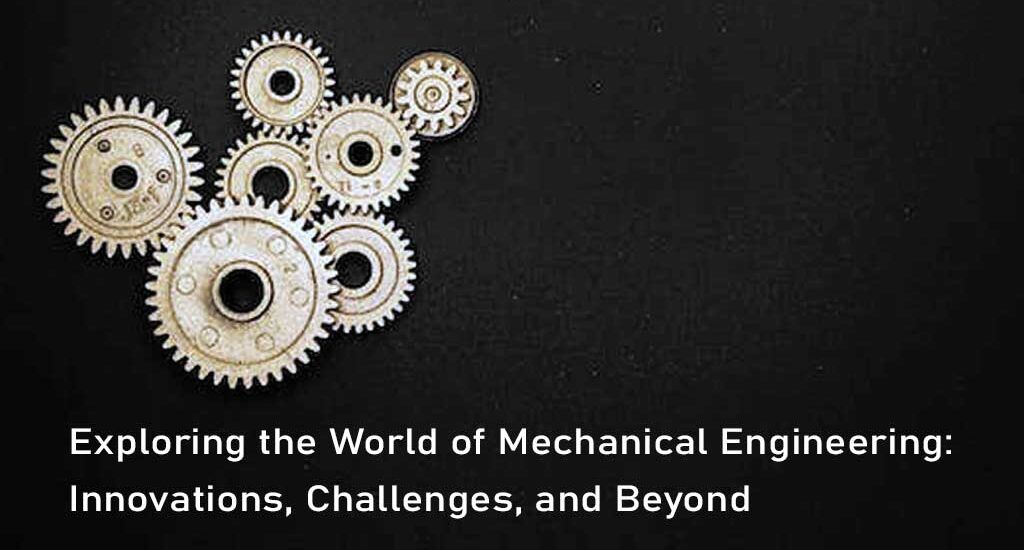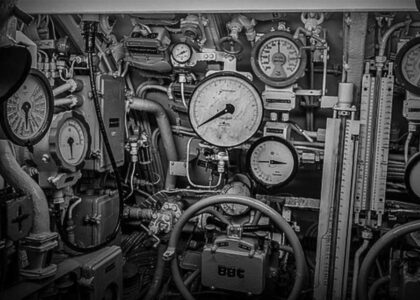Mechanical engineering, a cornerstone of technological progress, stands as a testament to human ingenuity and innovation. This diverse and dynamic field plays a pivotal role in shaping the modern world by addressing complex challenges and developing solutions that impact various industries. In this extensive exploration, we will delve into the multifaceted realm of mechanical engineering, examining its definition, delving into key areas of focus, unraveling its impact on our everyday lives, and addressing both the challenges it faces and the potential future directions it might take.
Table of Contents
Defining Mechanical Engineering:
At its core, mechanical engineering is an interdisciplinary branch of engineering that encompasses the design, analysis, manufacturing, and maintenance of mechanical systems. These systems range from intricate components to expansive machinery, influencing industries as diverse as aerospace, automotive, energy, robotics, and beyond. The primary objective of mechanical engineering is to apply principles from physics, mathematics, and material science to create efficient and reliable solutions that drive progress across a myriad of sectors.
Key Areas of Focus:
- Design and Analysis: Mechanical engineers are the architects of innovation, tasked with conceptualizing and designing mechanical systems that meet a myriad of requirements. This involves the creation of detailed plans and schematics, with considerations spanning functionality, safety, and cost-effectiveness. The advent of advanced software tools, such as Computer-Aided Design (CAD), has revolutionized the design process, enabling engineers to model and simulate their creations in virtual environments. This not only streamlines the design phase but also facilitates a more comprehensive analysis of the system’s performance before physical prototypes are constructed.
- Manufacturing and Production: The transition from design to reality is a crucial phase in mechanical engineering. Engineers overseeing the manufacturing and production process must select materials, coordinate production schedules, and ensure that quality standards are met. The landscape of manufacturing has been transformed by technologies like 3D printing and automation, offering unprecedented levels of efficiency and precision. These innovations not only accelerate production but also pave the way for more sustainable practices and cost-effective solutions.
- Thermodynamics and Fluid Mechanics: Understanding the principles of thermodynamics and fluid mechanics is fundamental for mechanical engineers working in areas such as energy systems, HVAC (Heating, Ventilation, and Air Conditioning), and aerospace. Engineers in these fields design systems that involve the transfer of heat or the flow of fluids, optimizing efficiency and performance. The integration of these principles is evident in the development of energy-efficient systems, advancements in aircraft propulsion, and the optimization of heating and cooling systems in various applications.
- Robotics and Automation: The fourth industrial revolution, often referred to as Industry 4.0, has propelled robotics and automation to the forefront of mechanical engineering. Engineers are tasked with designing robotic systems capable of performing tasks ranging from assembly line work to intricate surgical procedures. Automation not only enhances efficiency in manufacturing processes but also improves safety by minimizing human exposure to hazardous environments. As artificial intelligence continues to evolve, the synergy between mechanical engineering and cutting-edge technologies is opening up new frontiers in automation and robotics, reshaping industries, and expanding the possibilities of what can be achieved.
Impact on Everyday Life:
The influence of mechanical engineering extends far beyond the confines of research laboratories and manufacturing plants. Its impact is felt in the fabric of our daily lives, influencing various aspects of technology and infrastructure. Consider the following examples:
- Transportation: The automotive and aerospace industries heavily rely on the principles of mechanical engineering. From the design and manufacturing of automobiles to the development of aircraft, mechanical engineers play a pivotal role in shaping the transportation systems that connect the world.
- Energy Systems: As the world seeks sustainable energy solutions, mechanical engineers are at the forefront of developing technologies such as wind turbines, solar panels, and efficient power generation systems. Their expertise is crucial in harnessing renewable energy sources to power our homes and industries.
- Consumer Electronics: The design and production of consumer electronics, including smartphones, laptops, and household appliances, involve the meticulous work of mechanical engineers. Ensuring functionality, durability, and user-friendly designs are central to their contributions in this rapidly evolving sector.
Challenges and Future Directions:
While mechanical engineering has witnessed remarkable achievements, it is not without its challenges. Environmental sustainability, energy efficiency, and adapting to rapidly evolving technologies pose ongoing hurdles. Engineers are responding to these challenges with innovation and resilience, exploring new materials, embracing renewable energy solutions, and incorporating artificial intelligence into their designs. As we look towards the future, several potential directions emerge for the field of mechanical engineering:
- Environmental Sustainability: The imperative for sustainable practices has never been more critical. Mechanical engineers are exploring materials and technologies that minimize environmental impact. This includes the development of eco-friendly materials, energy-efficient systems, and the integration of circular economy principles into manufacturing processes.
- Advanced Materials and Nanotechnology: The quest for materials with enhanced properties is an ongoing pursuit. Mechanical engineers are delving into the realm of nanotechnology and advanced materials, seeking innovations that can revolutionize industries. From lightweight and high-strength materials for aerospace applications to self-healing materials for enhanced durability, the possibilities are vast.
- Integration of Artificial Intelligence: The intersection of mechanical engineering and artificial intelligence holds immense potential. AI-driven algorithms can optimize designs, predict maintenance needs, and enhance the efficiency of mechanical systems. The integration of machine learning and AI technologies into the field opens up new avenues for intelligent automation and data-driven decision-making.
- Human-Machine Interaction: With the rise of robotics and automation, the interaction between humans and machines becomes increasingly important. Mechanical engineers are exploring ways to enhance human-machine collaboration, ensuring that technology complements and augments human capabilities rather than replacing them. This includes the development of intuitive interfaces, haptic feedback systems, and collaborative robots.
Conclusion:
In conclusion, mechanical engineering stands as a pillar of innovation, driving progress across industries and shaping the technological landscape. Its practitioners are not merely engineers but visionaries, constantly pushing the boundaries of what is possible. As we navigate the challenges of the present and gaze toward the future, the field of mechanical engineering remains at the forefront of transformative change, poised to continue shaping the world in ways that we can only begin to imagine.
“Ji” Japsin Instrumentation – Since 1974







